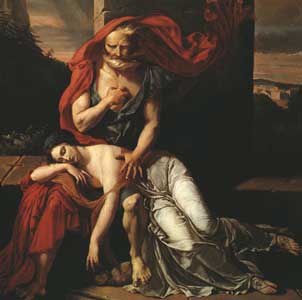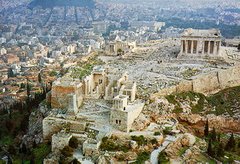
"So long as I am alive, no woman shall rule over me."
This is what Creon proclaims, full of arrogance. The conflict between Creon and Antigone seems to be based on pride most of all. Creon is so full of pride--hubris--that he will not even take the wise advice of Tiresias. When he confronts Antigone, he does not really ever consider if she is right. He will not stray from a prideful view. He thinks that Antigone is wrong simply because a woman cannot be better than a man. His pride also keeps him away from considering another point of view because he is king. The king is the ruler and he believe that this puts him in a position that cannot be challenged by anyone else.

It is this overwhelming pride that destroys Creon. He isn't a terrible leader, father, husband, he simply has too much pride. He cannot admit mistakes and must continue on, even when he is wrong, lest his pride will be damaged.
"Creon advocates obedience to man-made laws while Antigone stresses the higher laws of duty to the gods and one's family. Creon, the dramatic hero, only realizes his mistake after he loses the lives of all his family" (http://en.wikipedia.org/wiki/Antigone_%28Sophocles%29).

Antigone insists that the gods' laws are the only ones that really matter and the only ones that should be followed to the end. There is line in Steiner's book that says "The gods speak to us only through our hearts." This describes a god-man communication that is a bit different than most are though to be. This line seems to say that it is a person's true passion that is a god's will. It is the love that a sister has for a brother, this is what a god's will actually looks like. Communication with a god is not an melodramatic procedure, it is as simple as someone following their heart to the end, even if that end is death. This line shows that passion is the most important thing a person could ever have--it is the direct result of a god's communication.



